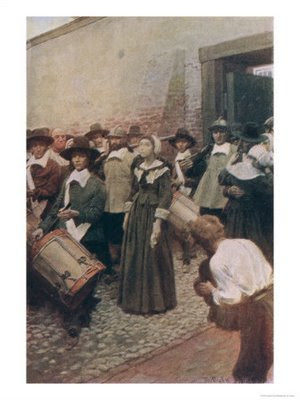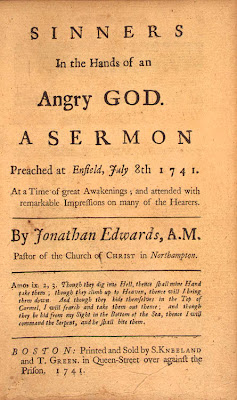
Mary Dyer on Her way to the Scaffold, by Howard Pyle (1906)
Mary Dyer, a Quaker, was hanged on Boston Common by Governor John Endicott in 1660.
I heard a pretty interesting program on NPR’s Fresh Air this week. Examining the Origins of America's 'Founding Faith' (39 minutes). It was an interview with Beliefnet editor Steven Waldman about his new book, Founding Faith: Providence, Politics, and the Birth of Religious Freedom in America. Waldman endeavors to debunk some myths about the “founding fathers” (and even seems to dispute that you can even say that there is such a group that can be accurately called that). Waldman claims that a set of diametrically-opposed myths have been built up around cherry-picked quotes selected by those who claim that the founding fathers wished to establish a Christian nation, and by those who claim that the founding fathers were simply Deists, Masons, and other types of skeptics who wanted to establish a decidedly secular state. According to Waldman, it’s more complicated than that, which is probably what most of us suspected anyway.

Jonathan Edwards,
Sinners in the Hands of an Angry God
Waldman somewhat disputes the notion that the original colonies were set up to establish “religious freedom”, pointing out that many, if not all of them, had strongly-established official ties between Church and State, as well as religiously-based criteria on who was allowed and not allowed to vote, etc… Many of these laws and official state religions persisted well after the Civil War. What Waldman does say about the original colonies was that they were, collectively, a Protestant redoubt. A fortress of the Reformation. It was as if each of the Protestant denominations at the time took a turn at trying to build the Kingdom of God, or Shining City on a Hill… About the only thing that they all had in common was a determination to be a bulwark against Popery and Romanism.

An image from the First Great Awakening.
George Whitefield was called "Dr. Squintum" by his critics...
Here are some links Beliefnet links about the book and the topic at hand.
Some interesting points to be heard in the NPR program and to read about on Beliefnet:
- The Establishment Clause of the First Amendment of the Constitution was initially understood to apply only at the Federal level. For many years afterwards, certain states still had their own established, official denominations. It wasn’t until after the Civil War and the passing of the Fourteenth Amendment that the Establishment Clause was understood to apply at the state level as well.
- George Washington, as evidenced in his speeches, believed that the success of the Revolution and the birth of the country was guided directly and only by the guiding hand of Divine Providence… He attended Anglican services, however, only about once a month, and did not take communion.
- Thomas Jefferson (unaware that the writing of St. Paul pre-dated the Gospels) was one of those who considered Paul the great corrupter of Christianity. A typical enlightenment thinker of his time, he denied the divinity of Jesus but considered his teachings to be sublime. He famously created his own cut-and-paste version of the Bible, excised of all that he considered supernatural humbug. Imagine a presidential candidate doing that today? Editing and cutting-and-pasting his own Bible? Nowadays, that's only done with policy and personal behavior.
- During the Revolutionary War, Washington, knowing that he had some Catholics in his ranks, and eager to enlist the help of Catholic France, was appalled by the Guy Fawkes Day celebrations of his troops, and banned further celebrations of it in the Continental Army.
- John Adams was a firm believer, and tried to jack Jefferson up a little bit, trying to make a Christian out of him. Jefferson let him know in the clearest terms just what he thought of Calvinism.
- The key man on the First Amendment was James Madison. He certainly couldn’t be described as a fundamentalist in his own beliefs, but he had many friends that he admired among the Baptists, and it was from them that he lit upon the idea and settled upon the conviction that Separation of Church and State was the principle that would be most conducive towards allowing religion in the United States to flourish. The free flourishing of religion was the goal.
6 comments:
Howard Pyle! I really liked him when I was in college and still have some pics of his drawings - he's great.
Jefferson and his bible - I hate that he took out all the miracles. I guess I do tend to think of all those guys as masonic diests.
Hi Crystal,
Yes. Howard Pyle was excellent, but was far exceeded by his most brilliant pupil, N.C. Wyeth. My favorite illustrator.
Yeah, I think what Jefferson did was pretty arrogant, trying to make Jesus into someone like himself, or rather, how he liked to see himself.
Jeff,
What do you think of Bill Gates wanting congree to increase the cap on visas for foreign tech workers? I don't really understand about it but I can't help thinking it's a bad idea?
I suppose Gates would say that he needs them to fill skill gaps that are critical for his company... Skeptics would say that he just wants to hire those skills more cheaply, and with employees who are more compliant and docile, beholden to him for those visas.
I've been seeing a fair amount of coverage of Waldman's book on the liberal blogs. And he spent last week blogging himself at Talking Points Memo.
I suppose I should investigate the book. I've never believed these guys were that similar to current fundamentalists, though the fundies try to claim them. Nor do I think they were straight enlightenment dudes.
And, once again, I hate to bring it up, but we're still dealing with a narrow definition of religious history in "America," that of the British colonies in the Northeast and South. The history and influence of religion in Florida, Louisiana, Texas and points west was completely different. The Spanish had already established Catholic missions in the U.S. for 276 years before the Declaration of Independence. Not that it matters to the WASP East-Coasters who dominate all discourse on "American History"!!! :-)
No doubt about it. Someday I'd love to do that Mission Trail in California...
My brother-in-law actually wrote a book about the history of the archdiocese of St. Augustine - Cross & Crozier
Post a Comment